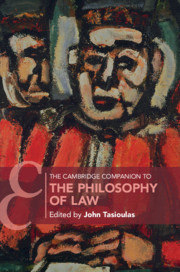Book contents
- The Cambridge Companion to the Philosophy of Law
- Cambridge Companions to Law
- The Cambridge Companion to the Philosophy of Law
- Copyright page
- Dedication
- Contents
- Contributors
- Introduction
- Part I General Theory
- Part II Values
- Part III Special Theory
- 12 Causation and Responsibility
- 13 Punishment
- 14 Constitutional Law
- 15 Civil Rights and Liberties
- 16 Criminal Law
- 17 Contract
- 18 Tort Law and Its Theory
- 19 Property Law
- 20 International Law
- Index
14 - Constitutional Law
from Part III - Special Theory
Published online by Cambridge University Press: 15 June 2020
- The Cambridge Companion to the Philosophy of Law
- Cambridge Companions to Law
- The Cambridge Companion to the Philosophy of Law
- Copyright page
- Dedication
- Contents
- Contributors
- Introduction
- Part I General Theory
- Part II Values
- Part III Special Theory
- 12 Causation and Responsibility
- 13 Punishment
- 14 Constitutional Law
- 15 Civil Rights and Liberties
- 16 Criminal Law
- 17 Contract
- 18 Tort Law and Its Theory
- 19 Property Law
- 20 International Law
- Index
Summary
Constitutional law is a sprawling subject, encompassing many topics of legal–philosophical interest. This chapter addresses several of the most fundamental and widely discussed issues, organised into three clusters. First, what is constitutional law and what are its necessary or central features or functions? Second, what is the proper role for the judiciary in enforcing constitutional law? Third, how should constitutions be interpreted? Under these headings, the chapter examines, among other things: the puzzle of ‘unwritten’ constitutions, differences between constitutional ‘conventions’ and constitutional law, and the relationship between theories of constitutional interpretation and general jurisprudential accounts of the nature or contents of law. Most issues that especially concern constitutional rights lie beyond the scope of this chapter.
- Type
- Chapter
- Information
- The Cambridge Companion to the Philosophy of Law , pp. 271 - 290Publisher: Cambridge University PressPrint publication year: 2020

